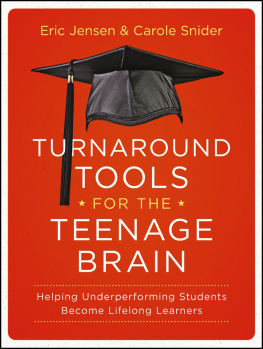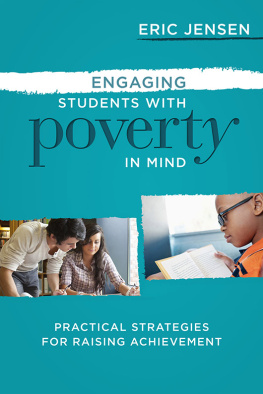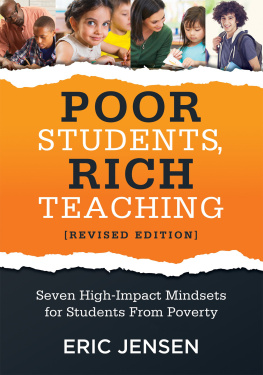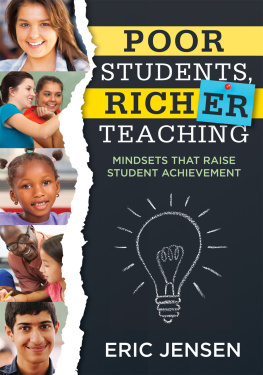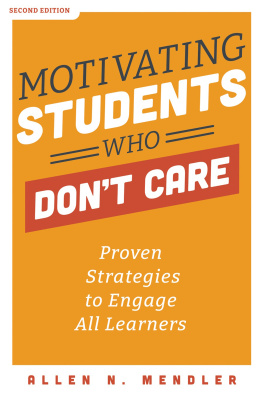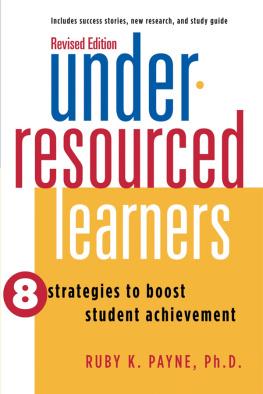
Cover image: Discpicture / Shutterstock
Cover design: Jeff Miller, FaceOut Studio
Copyright 2013 by John Wiley & Sons, Inc. All rights reserved.
Published by Jossey-Bass
A Wiley Brand
One Montgomery Street, Suite 1200, San Francisco, CA 94104-4594 www.josseybass.com
No part of this publication may be reproduced, stored in a retrieval system, or transmitted in any form or by any means, electronic, mechanical, photocopying, recording, scanning, or otherwise, except as permitted under Section 107 or 108 of the 1976 United States Copyright Act, without either the prior written permission of the publisher, or authorization through payment of the appropriate per-copy fee to the Copyright Clearance Center, Inc., 222 Rosewood Drive, Danvers, MA 01923, 978-750-8400, fax 978-646-8600, or on the Web at www.copyright.com. Requests to the publisher for permission should be addressed to the Permissions Department, John Wiley & Sons, Inc., 111 River Street, Hoboken, NJ 07030, 201-748-6011, fax 201-748-6008, or online at www.wiley.com/go/permissions.
Permission is given for individual classroom teachers to reproduce the pages and illustrations for classroom use. Reproduction of these materials for an entire school system is strictly forbidden.
Limit of Liability/Disclaimer of Warranty: While the publisher and author have used their best efforts in preparing this book, they make no representations or warranties with respect to the accuracy or completeness of the contents of this book and specifically disclaim any implied warranties of merchantability or fitness for a particular purpose. No warranty may be created or extended by sales representatives or written sales materials. The advice and strategies contained herein may not be suitable for your situation. You should consult with a professional where appropriate. Neither the publisher nor author shall be liable for any loss of profit or any other commercial damages, including but not limited to special, incidental, consequential, or other damages. Readers should be aware that Internet Web sites offered as citations and/or sources for further information may have changed or disappeared between the time this was written and when it is read.
Jossey-Bass books and products are available through most bookstores. To contact Jossey-Bass directly call our Customer Care Department within the U.S. at 800-956-7739, outside the U.S. at 317-572-3986, or fax 317-572-4002.
Wiley publishes in a variety of print and electronic formats and by print-on-demand. Some material included with standard print versions of this book may not be included in e-books or in print-on-demand. If this book refers to media such as a CD or DVD that is not included in the version you purchased, you may download this material at http://booksupport.wiley.com. For more information about Wiley products, visit www.wiley.com.
Library of Congress Cataloging-in-Publication Data has been applied for and is on file with the
Library of Congress
978-1-118-34305-0 (paper), 978-1-118-59001-0 (ebk), 978-1-118-59002-7 (ebk), 978-1-118-59016-4 (ebk)
About the Authors
Eric Jensen is a former teacher who has taught students from the elementary level through the university level. Jensen cofounded SuperCamp, the nation's most innovative and largest academic enrichment program, now with nearly sixty thousand graduates. He has authored twenty-six books, including Enriching the Brain, Student Success Secrets, Teaching with the Brain in Mind, 30 Days to Bs and As, SuperTeaching, and Teaching with Poverty in Mind.
Jensen's academic background includes a bachelor's degree in English and a master's degree in organizational development, and he is completing his doctoral degree. As a leader in the mind and brain movement, Jensen has made over fifty-five visits to neuroscience labs and interacts with countless neuroscientists. He is deeply committed to making a positive, significant, lasting difference in the way we learn. Jensen's public programs are found at www.jensenlearning.com. Currently, Jensen does staff development, conference speaking, and in-depth trainings.
Carole Snider is a former teacher and school counselor from Ohio public schools. Snider's experience includes teaching middle school English and providing counseling services for children from grades K through 12. Snider currently serves on the state governing board for Ohio school counselors, is an adjunct professor, and recently authored the graduate course Succeeding with Students of Poverty. She has organized and facilitated numerous staff development and conference presentations on teaching the whole child, team building, stress management, and raising student achievement for schools across the United States.
Snider holds a bachelor's degree in education and a master's degree in guidance and counseling. She is driven by the belief that every child can be successful, and that schools are honored and have the opportunity to facilitate this success. She is passionate about promoting total fitnessmind, body, and soulfor people of all ages, and continues her research in this area. Carole lives with her husband in Batavia, Ohio. She continues to offer staff development and conference presentations for educators and can be contacted at .
Acknowledgments
Eric Jensen
First, we both appreciate our editor, Marjorie McAneny, who approved this project and has provided encouragement and guidance. Further, I am indebted to the scientists, researchers, and editors who made this book happen, including Pam Rooks and Nanette Metz. Finally, I am very grateful for the partnership with Carole, who initiated this book. Her commitment to student achievement has helped drive this effort, and any success is mostly hers.
Carole Snider
I want to give special thanks to all the teachers who have shared their stories of success and sometimes failure with me. Many thanks to Rita for listening to, questioning, and encouraging me throughout this process. I will always be deeply indebted to Eric for his belief in me, and for his continual support in bringing this project to fruition. And a final thank you to my husband, Cliff; two sons, Jeff and Gary; daughter in love, Kathleen; and grandchildren, Tyler, Skylar, JT, and Summer. I could not have done this without you.
Introduction
This book was born as we worked with teachers across the United States and other countries who shared their deep-seated frustration and anguish in regard to their struggling students. We are grateful for their willingness to open their hearts and reveal to us their desire to do more, to be better. We have seen firsthand the professionalism, hard work, and undying dedication of these teachers as they search for answers to their challenges. We thank them for their commitment and for their ongoing determination to help these students.
Schools can no longer accept the fact that large numbers of students are not graduating, and as a result are more likely to be on their way to economic struggles rather than success and satisfaction. We believe that every student can learn, but perhaps at a different pace or in a different manner compared to other students. We have witnessed schools in which success is for all, not just the select few. We have also observed schools in which the success gap is widening rather than closing. We have seen students who are lethargic, overweight, depressed, angry, and failing academically, and who have poor personal and interpersonal skills. They seem to be simply putting in their time. This is devastating for us because we know it doesn't have to be this way.
Knowing that most teachers are already investing 100 percentplus in these students, we turned to the research for answers on how to turn the struggling kids around. This book has been several years in the making, which is a short time to work on a topic of this magnitude and significance. What we have written represents a research-based approach to the often overwhelming dilemma of how to help struggling students. We are convinced that applied research can provide the solutions that last a lifetime for these students. Acknowledging the multitude of ways to measure success, we have focused on the short term for current academic success, and have focused equally on the skills students need for lifelong achievement. Often these skills are one and the same, which was encouraging for to discover us as we kept digging for answers. We feel that schools can be positive and powerful places for the struggling student, and that they are the only hope some kids may have.
Next page
